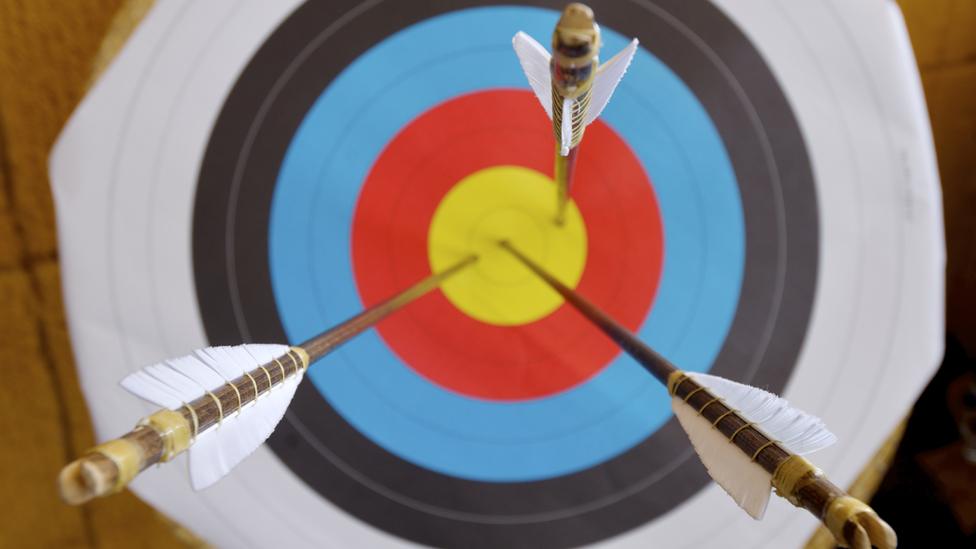The Vocabularist: How target once meant shield
- Published

Boris Johnson was last week described as the "top target" for Brexit campaigners to front their campaign. But what are the roots of the word target?
Measures are said to target cancer cells or domestic abuse, while overseas aid can be targeted at those who most deserve it. Reaching a target means success in military and business terms, but setting targets in fields such as health or education invites controversy. Where does the word come from?
Targe meaning a little round shield seems to have come from a Teutonic word for a rim, like the German zarge meaning frame. There is also a Spanish word adarga for a shield, reflecting the Arabic al-daraqa.
The Oxford English Dictionary believes targe, of which target is a diminutive, came into English twice, the first time via Scandinavia, the second from French.
This might explain the puzzle of the pronunciation. The rule is complicated - think of nugget and forget - but still we might expect the g to be soft in target, as it is in large (and targe).
Certainly there were two forms of the word - target and targat. In the mid-16th Century the king's "sword, his target and his helm" were reportedly carried in a procession. At the same time Roger Ascham was writing of Roman soldiers covering themselves "with theyre shyldes and targattes".
Our word seems to have inherited the spelling of one form and the pronunciation of the other.
The recorded use of target as something to aim at came quite late. Older words for the same thing are butts (15th Century) and mark (13th Century).
A paper called the True Patriot in February 1746 proposed rewards for the soldier in each company "who shoots best at a target."
Its general use as an intended victim appeared soon after. In a satirical poem of 1757 the hymn-writer Edward Perronet calls an opponent "the target of the Muse" (ie of writers).
A note explained that the word was "used in the military sense, and signifies a But or mark to be shot at" suggesting that this sense was still not very well known.

A target was originally a shield - usually reckoned to be a little round one like that wielded by Captain America and his imitators
Later, target became used for an objective or aspiration. During World War Two, with its fundraising drives and production speed-ups, the concept of target-setting became very common.
In 1942 the Times reported that Coventry was "set a target" of raising £1,250,000 for a new cruiser. The following year the salvage authorities "set themselves a target" of rescuing 50 million books from bomb-damaged buildings.
Because target originally meant shield, the verb "to target" could mean protect, the opposite of what it often means today.

The Vocabularist
Select topic "language" to follow the Vocabularist on the BBC News app

Subscribe to the BBC News Magazine's email newsletter, external to get articles sent to your inbox.